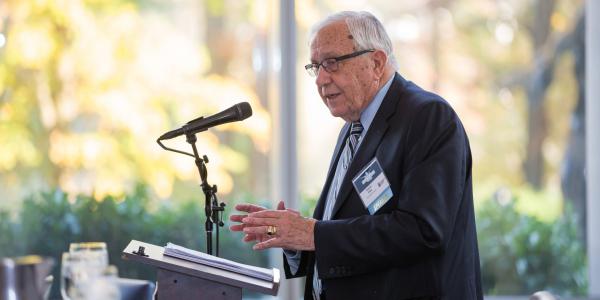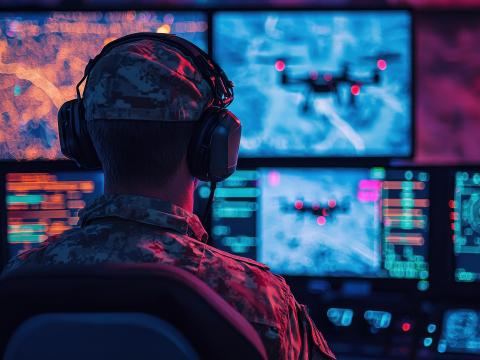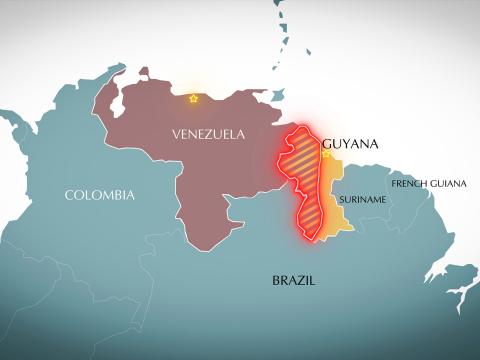All That's Old Is New Again
The generation that remembers “duck and cover” also recalls headlines that included the words Soviet Union and impending dangers. Today, a combination of global instability, rising authoritarianism and democracies in retreat may lead to similar yet more dangerous situations, and this time, the headlines also are likely to include the words “People's Republic of China.”
Charlie Allen, principal at The Chertoff Group, says that countries as well as state and nonstate actors can damage U.S. security very seriously. His assessment of dangers in today's world is sobering. "The aggregation of the threats, velocity of the threats and the depth of damage that can be done to U.S. interests both at home and abroad are the most significant since we had a nuclear strategic stand-off with the Soviet Union," he states.
Allen's experience makes him an expert in the intelligence and national security realms. In addition to being the former undersecretary for intelligence and analysis for the Department of Homeland Security, he worked as the assistant director of central intelligence for collection for the CIA at the time of the 9/11 attacks. But those are only two of his more recent positions. During his more than 40 years at the CIA, he earned a reputation for plain speaking, even when his opinions differed from those of senior officials.
Drawing on his years of experience, Allen sees new threats looming. "Ultimately, our most dangerous threat has to do with the threat of proliferation—that's long-term, but it's growing and increasing at a faster rate. In that proliferation feature, we have to bring in the Russian Federation and China because of the way they're operating globally. We have a very autocratic leader in Moscow, so we have to understand the depth and breadth of the Russian threat to the countries in Eastern Europe that are NATO countries as well as those that are not part of NATO such as the Ukraine," he says.
The United States also must understand how Russia is operating in other areas of the world such as the Middle East where Moscow is engaged in a very anti-U.S. effort, he adds.
Beyond these dangers, Allen perceives cyber operations as a major threat for the years ahead. "The Russians have weaponized the use of data and the use of their ability to conduct influence operations. In 2016, they conducted a classic active measures campaign. They had weaponized the use of cyber. That made it distinctly different. They continued their influence operations in other countries of Europe. Putin's goal is to diminish the power and influence globally of the U.S. and to shatter or splinter NATO," he says.
The proliferation of missiles, nuclear technology and biological warfare as well as the availability of chemical weapons that virtually any country and nonstate actor can obtain also troubles Allen. “Gene splicing raises a whole specter of the ability to create viruses that are antibiotic resistant, something that was worked on in the past by the Soviet Union,” he relates.
Allen also is concerned about the proliferation of technology superimposed on traditional weapons. "Advanced technologies can be used for good or for evil. We have artificial intelligence and machine learning. The Chinese are putting at least four times the amount of funding into that area than the United States. The United States still has the lead in AI and machine learning, but that lead is narrowing. China's working at it very hard as are other countries," he says.
Other emerging technologies also could affect future warfare. 3-D printing will experience a boon, and countries that can take a lead in this technology are going to be important, he predicts.
Although technologies such as big data and big data analytics are crucial, machine learning will be revolutionary. "We had the chip revolution in the 1980s; we later had the broadband revolution; and now we have the artificial intelligence and machine learning revolution, and we must stay ahead of that," he states.
Allen will lead a discussion about increasing global disorder and the current security environment at the AFCEA 2018 Spring Intelligence Symposium, a classified event. The panelists will include Chris Bort, national intelligence officer, Russia and Eurasia, National Intelligence Council (NIC), DNI; Neil Wiley, director of analysis, DIA; Randall Blake, national intelligence officer for transnational threats, NIC; and John Culver, national intelligence officer for East Asia, NIC.
A great deal of industry’s efforts will be discussed at the symposium, including topics such as how to handle overwhelming amounts of data collected. “I would suggest that we have so much data that we’re not able to process all of it. When I look at the processing challenges of the NSA, FBI, CIA and others face, it’s pretty stunning to make, as Andrew Hallman [Deputy Director for Innovation, CIA] once said to me, ‘What does all of this stuff really mean? What can we pull from petabytes of data?’” Allen relates.
One of the questions Allen has asked his panel members to consider in preparation for the panel discussion is, “Are we well positioned as an Intelligence Community to provide a warning of flashpoints/breakpoints prior to a full-blown crisis?” He says the answer to this question is important because the IC’s prediction record could be likened to that of weather forecasters.
“[We have] been extraordinarily slow, and we have not anticipated those abrupt discontinuities because we were not positioned to think of warning and think about how to think about the world of the future. There will be big break points. We had an Arab Spring where I don’t think the IC did well. We had the rise of ISIS; we were surprised by the speed at which it established a caliphate. The move of the Russians into the Middle East: They began bombing [Syria] on the 29th of September 2015, but they were getting ready to move into the Middle East long before that. I don’t think we served the last president well, and I hope we’ll serve this president better when it comes to strategic warning,” Allen states.
AFCEA regularly brings together IC and industry in classified environments to discuss the challenges the community faces as it attempts to predict future activities of adversaries. Learn more about other experts speaking at the Spring Intelligence Symposium online and explore upcoming classified events on the AFCEA website.





Comments